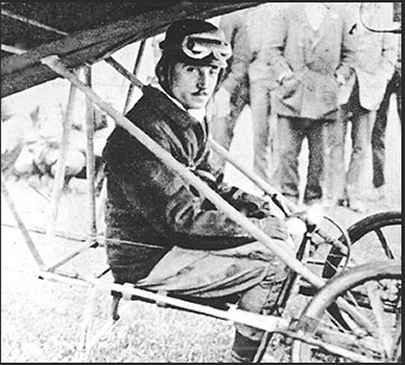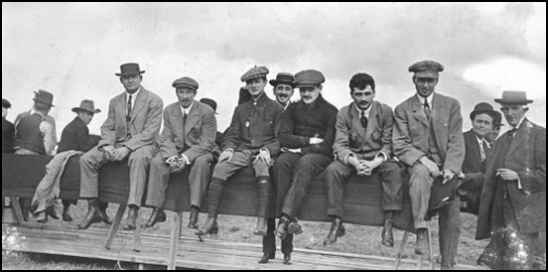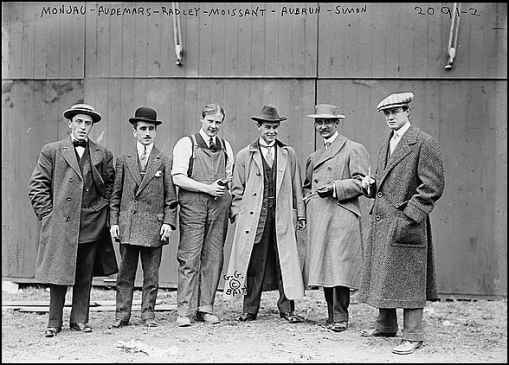
1882-1970 |
 |
Photo courtesy of Jean-Claude Cailliez, 11-5-04 |
 |
|
Sitting, l-r: Joseph Seymour, John Frisbie, Rene Simon ('flying fool'), Edmund Audemars, Rene Barrier, Roland Garros, Peter Young (manager), and Charles Hamilton (standing) From AIRSHOW, Houston, Texas 1911 By permission of Story Sloane, 10-12-09 |
|
The Daily Journal and Tribune, Knoxville, Tennessee: September 8, 1912, Transcribed by Bob Davis - 6-11-04 This Week's Program" The meeting embraces daily monoplane and biplane handicap races, a scratch biplane and monoplane race which is designed to give further demonstration of the skill of the Gordon Bennett drivers, and a 40-kilometer race for all types, handicapped. Other contests are bomb and mail throwing, accuracy landing contests from heights of 1,000 feet without a motor and similar events in which the skill of the operator is tested. This is the fourth time aeroplanes have been matched for the world's championship, as typified by the $10,000 silver trophy given by James Gordon Bennett in 1908 to be contended for annually by licensed pilots of the Federation Aeronautique Internationale. Twice before a single American entrant has driven his aeroplane ahead of his competitors and brought the silver trophy to America. Glenn H. Curtiss was the first winner, at Rheims, France, Aug. 28, 1909. His biplane finished the 12.4 mile race in 15 minutes, 50 seconds, or five seconds ahead of the looked-for winner, Louis Bleriot's monoplane. There were five starters, but only four of the flyers were able to cover the distance, which then was considered an almost impossible journey for an aeroplane. In New York on the Belmont park aerodrome, the second contest was held. The course had been lengthened to 100 kilometers (62.14 miles) and Claude Graham-White, England's best known airman, won in 71 minutes, 4 seconds, in the first 100-horsepower Bleriot monoplane built. Alfred LeBlanc, of France, led in the race in a similar machine, up to the last lap of the field, when he ran out of gasoline and in landing, crashed into a telephone pole and smashed his aeroplane. Graham-White's victory took the trophy for England, where it was contested for in 1911 on the Isle of Sheppy at Eastchurch, July 1. Charles Terres Weymann, sole American entrant, again went up in a 100 horsepower Nieuport monoplane and captured the trophy. His time for the 100 kilometers was 81 minutes, 30 seconds, a speed of over eighty miles an hour, then a world's speed record. Leblanc again after the world championship, had to content himself with second, being two minutes slower than Weymann. Speed alone determines the winner, there being no restriction on the construction of the aeroplane. Because of the high speeds obtained, few aviators have cared to enter, and in the three events held previously, a total of thirteen entrants only appear on the lists. This year the race has been lengthened to 200 kilometers (124 miles), and the course was laid out as an ellipse of 4.14 miles, requiring thirty laps to complete the races. In the French elimination trials, Jules Vedrinesmade a speed of 100 miles an ahour, which established expectance as to what speed would be made by the choice machines of the six nations competing - America, England, France, Holland, Belgium and Switzerland. France designated Jules Vedrines and Maurice Prevost, pilots of Deperdussin monoplanes, and Andre Frey, who drives an Hanriot monoplane, as its representatives. England had named Claude Graham-White, Gustave Hamel and George Dyott, but it was certain until the last minute just who would make the actual flights. Belgium's representative, Charles Morok, died of typhoid fever a few days before the race, and Jan Wynmalen, who was to represent Holland, was so disappointed in the showing of his Oerts monoplane, he withdrew. Edmond Audemars, Switzerland's representative, was not certain of entering, and as for America, the choice of pilot will not be definitely settled till the day before the race. An American defender prepared to carry a 100 horsepower motor, the largest aero motor ever designed. The hydroaeroplane, or airboat, aviation contests are the first ever held outside military competetions held in France for selection of government machines. The contests must continue five days during which races and contests are evolved to demonstrate how the multi-use machine may be guided on the water, be raised into the air and flown as a flying craft. In addition efficiency prizes have been offered, the contest being the numbers of passengers carried, the length of time one, two, and three extra persons may remain aloft, and other similar competitions." Bob Davis |
 |
|
Edmond Audemars - John Moissant Emile Aubrun - René Simon Library of Congress, 7-13-08 |
|
via email from Jean-Claude Cailliez, 11-5-04 Then, with the Moisant "Aviation Circus", he flew over some US cities from Christmas, 1910 to early (March?) 1911, also including some flights over Mexico and Cuba. At the beginning of 1912, he was again on a circus tour in Argentina. He was the close friend of Roland Garros and stopped to flying when Garros died (1918). He was a very good stunt pilot who earned a lot of prizes including the Paris-Berlin (1912) and Berlin-Paris (1913) races. He was later associated with the Jaegger-Lecoultre company all the rest of his life, (watches, chronos, flight instruments, jewelry). Cordially Jean-Claude Cailliez Historien de l'aviation 75 avenue de Mategnin CH-1217 Meyrin, Suisse tél/fax +41 22-782.30.39 prof +41 22-327.43.65 |
|
via email from Dave Lam, 11-14-04 |
|
|
|
|
|
|
|
via email from Pete Jones, 10-16-08 |
|
If you have any more information on this pioneer aviator please contact me. E-mail to Ralph Cooper |


|